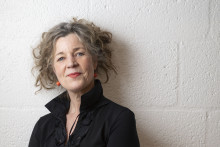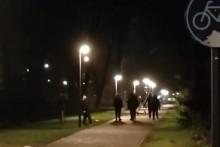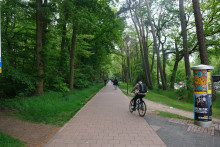Here's a quote from a different verse: Nobody dares to make love anymore, because the guards are coming. According to the stories going around, the former THT - which has since become the UT - did everything it could to offer students a safe environment. At Drienerlo, there was plenty of time for study, contemplation and little else besides. Barriers that came down at night; a special student dean who issued warnings; a mandatory stay on campus for the first two years of your studies; being forced to purchase coupons to eat in the mensa; no girls allowed at night. It all sounds terribly restrictive. Did students really have their freedom taken away to such an extent? How did they actually feel about the rules?
Now, almost sixty years later: COVID-19 has led to severe restrictions on campus. We must maintain a safe distance of 1.5 metres from each other at all times. Online education. Empty drinking halls. Partying, making music and playing sports together are forbidden. Staff log in from home. Everyone has to wear a face mask and wash their hands religiously.
Back to the sixties. I asked five students and staff members with first-hand experience how restrictive the campus really was.
Those barriers? They didn't exist. At the main entrance, there was a gate that never closed. Thin chains were hung across the other entrances at night, but you could easily get past those on your bike or on foot. The chains were there to keep out thieves in cars. Theft was a major problem back then. Students could come and go as they pleased at all hours of the day and night.
What about the student dean? For years, professor Jan Schuijer played that role. He took a benevolent approach. His wife Elly and he lived on campus and their door was always open. In those early years, the university of applied sciences was one big community. Everyone - especially the students - took part in the exciting ‘experiment in the woods’. Wim Hoogendoorn, a first-year student in 1965, was a co-founder of the association for cultural activities, Studium Generale, the Student Council. Students would bring famous pianists like Cziffra or writers like Mulisch to Twente.
Was the campus a place where one would focus solely on one's studies? Certainly not. Rather, it was a place where one could become a well-rounded and knowledgeable individual, an expert organiser, an athlete, a performer or a pub crawler. What if you had a class early the next morning? Eduard van Emmerik, who enrolled in 1966: ‘There was no mandatory attendance for the lectures. Furthermore, we could take as long as we wanted to complete our studies. I never experienced any social control. Freedom reigned.’ Researcher Henny Kramers-Pals moved into a campus apartment in 1965. Before that time, she had lived on campuses in the United States, which were incredibly strict. She had also rented a small room from a landlady in Rotterdam, which was equally horrible. By comparison, the campus was a breath of fresh air.
What about the rule stating that no girls were allowed to spend the night? Well, there was no one there to check. Marijke, Wim's girlfriend, often slept over. His was not the only shared bed.
Why, then, this persistent rumour of the campus being so restrictive in those years? Perhaps that is because the rules were written down, but rarely enforced. Isn't that the same problem we face today in corona times?
Hiska Bakker is a historian, journalist and a presenter at Studium Generale.







